Friday, November 17
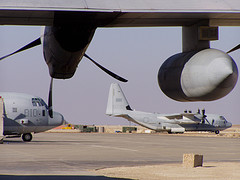
No Exit? What It Means to "Salvage U.S. Prestige" in Iraq
by Tom Engelhardt, TomDispatch, November 17, 2006
Things are always complicated. In the Washington Post, for instance, James Mann, author of Rise of the Vulcans recently suggested that it was far "too simplistic" to claim "the appointment of Robert M. Gates to replace Donald Rumsfeld [represents] the triumph of Bush the Father's administration over Bush the Son's."
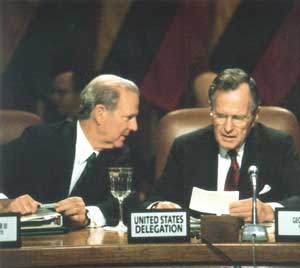
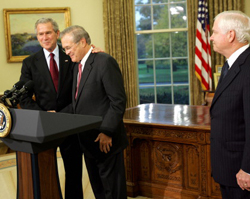
James Baker III Robert Gates, new Defence Secretary
Still, I prefer the analysis of Washington Post reporter (and author of Fiasco) Thomas Ricks. When asked by the Post's media columnist Howard Kurtz whether a Newsweek headline, "Father knows best," was just "an easy, cheap Oedipal way for the press to characterize what's going on," Ricks replied: "Well, just because it's easy and cheap doesn't mean it's wrong."
At a moment when every version of the dramatic arrival of James A. Baker III and Robert Gates on the scene -- and the scuttling of Rumsfeld's Titanic -- is at least suspect, it's still worth considering the bare bones of what can be seen and known -- and then asking what we have.
[...more]
Permanent Facts on the Ground
As the New York Times revealed in a front-page piece by Thom Shanker and Eric Schmitt on April 19, 2003, just after Baghdad fell, the Pentagon arrived in the Iraqi capital with plans already on the drawing board to build four massive military bases (that no official, then or now, will ever call "permanent").
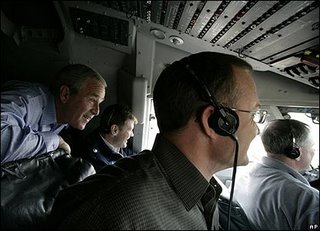
Today, according to our former Secretary of Defense, we have 55 bases of every size in Iraq (down from over 100); five or six of these, including Balad Airbase, north of Baghdad, the huge base first named Camp Victory adjacent to Baghdad International Airport, and al-Asad Airbase in western Anbar province, are enormous -- big enough to be reasonable-sized American towns with multiple bus routes, neighborhoods, a range of fast-food restaurants, multiple PX's, pools, mini-golf courses and the like.
Though among the safest places in Iraq for American reporters, these bases have, with rare exceptions, gone completely undescribed and undiscussed in our press (or on the television news).
From an engineering journal, we know that before the end of 2003, several billion dollars had already been sunk into them. We know that in early 2006, the major ones, already mega-structures, were still being built up into a state of advanced permanency.
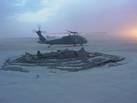

Balad, for instance, already handled the levels of daily air traffic you would normally see at Chicago's ultra-busy O'Hare and in February its facilities were still being ramped up. We know, from the reliable Ed Harriman, in the latest of his devastating accounts of corruption in Iraq in the London Review of Books, that, as you read, the four mega-bases always imagined as our permanent jumping-off spots in what Bush administration officials once liked to call "the arc of instability" were still undergoing improvement.
Without taking the fate of those monstrous, always-meant-to-be-permanent bases into account -- and they are, after all, just about the only uniformly successfully construction projects in that country -- no American plans for Iraq, whatever label they go by, will make much sense. And yet months go by without any reporting on them appearing. In fact, these last months have gone by with only a single peep (that I've found) from any mainstream publication on the subject.
The sole bit of base news I've noticed anywhere made an obscure mid-October appearance in a Turkish paper, which reported that the U.S. was now building a "military airport" in Kurdistan. A few days later, a UPI report picked up by the Washington Times had this: "Following hints U.S. troops may remain in Iraq for years, the United States is reportedly building a massive military base at Arbil, in Kurdish northern Iraq."
Kurdistan has always been a logical fallback position for U.S. forces "withdrawing" from a failed Iraq. But so far nothing more substantial has been written on the subject.
There is, however, another symbol of American "permanency" in Iraq that has gotten just slightly more attention in the U.S. press in recent months -- the new U.S. embassy now going up inside Baghdad's well-fortified Green Zone and nicknamed by Baghdadis (in a sly reference to Saddam Hussein's enormous, self-important edifices) "George W's Palace."
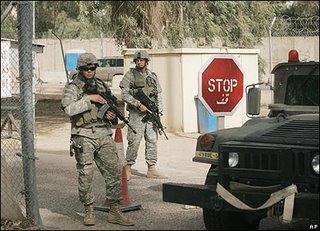
It's almost the size of Vatican City, will have its own apartment buildings (six of them) for its bulked-up "staff" of literally thousands and its own electricity, well-water, and waste-treatment facilities to guarantee "100 percent independence from city utilities," not to speak of a "swimming pool, gym, commissary, food court and American Club, all housed in a recreation building" and it's own anti-missile system. Ed Harriman tells us that it's a billion dollar-plus project -- and unlike just about every other construction project in the country, it's going up efficiently and on schedule. It will be the most imperial embassy on the planet, not exactly the perfect signal of a sovereign Iraqi future.
[...more]
The Uncovered War
Here's another mystery of Iraq (and Afghani) coverage: The essential American way of war -- air power -- has long been completely MIA, except at websites like this one. There has been not a single mainstream piece of any significance on the air war these last years, with the single exception of journalist Seymour Hersh's remarkable December 2005 report, "Up in the Air," in the New Yorker. ("A key element of the drawdown plans, not mentioned in the President's public statements, is that the departing American troops will be replaced by American airpower.
Quick, deadly strikes by U.S. warplanes are seen as a way to improve dramatically the combat capability of even the weakest Iraqi combat units.")
It is, of course, an irony that the only American reporter to look up and notice all those planes, helicopters, and drones overhead has never been to Iraq.
Such modest coverage of the air war in Iraq as exists in our press generally comes in the form of infrequent paragraphs buried in wire service round-ups as in a November 14th Associated Press piece headlined, "U.S. General Confronts Iraqi Leader on Security":
"On Monday night, U.S. forces raided the homes of some Sadr followers, and U.S. jets fired rockets on Shula, their northwest Baghdad neighborhood, residents said. Police said five residents were killed, although a senior Sadr aide put the death toll at nine. The U.S. military said it had no comment."
This incident assumedly took place somewhere in the vast Baghdad slum of Sadr city. In other words, we're talking about American planes regularly sending rockets or bombs into relatively heavily populated urban areas.
All you have to do is imagine such a thing happening in an American city to grasp the barbarism involved.
And yet, over these years in which such targeting has been commonplace and, in larger campaigns, parts of cities like Najaf and Falluja have been destroyed from the air, hardly a single reporter has gone to an air base like Balad and simply spent time with American pilots.
Not surprisingly, this remains a non-issue in this country.
How could Americans react, when there's no news to react to, when there's next to no information to be had -- which doesn't mean that information on our ongoing air campaigns is unavailable.
In fact, the Air Force is proud as punch of the job it's doing; so any reporter, not to speak of any citizen, can go to the Air Force website and look at daily reports of air missions over both Iraq and Afghanistan. The report of November 15th, for instance, offers the following:
[...more]
Here's the crucial thing: American troop levels simply cannot be slowly drawn-down in Iraq without -- as in Vietnam -- some increase in the use of air power.
And yet, you can look far and wide and find no indication of any public discussion of this at the White House, in Congress, or in what we know of the deliberations of the Iraq Study Group. And yet, as the Iraqi chaos and strife grows while the American public increasingly backs off, air power will be one answer. You can count on that.
And air power -- especially in or "near" cities -- simply means civilian carnage. It will be called "collateral damage" (if anyone bothers to call it anything at all), but -- make no mistake -- it will be at the heart of any new strategy that calls for "redeployment" but does not mean to get us out of Iraq.
"A True Disaster for the Iraqi People"
On ABC's Sunday political talk show, "This Week," White House Chief of Staff Josh Bolten had this to say: "I don't think we're going to be receptive to the notion there's a fixed timetable at which we automatically pull out,
because that could be a true disaster for the Iraqi people."
With hundreds of thousands of dead and more following daily, it makes you wonder exactly what it's been so far for the Iraqi people, as Bolten sees it.
But perhaps he's right; perhaps the disaster behind us will be nothing compared to the disaster ahead, especially if Daddy's Boys, the Iraq Study Group, other Democratic and Republican movers and shakers, and all those generals and former generals floating around our world decide that this isn't the moment to rediscover a Colin Powell-style "exit strategy," but "one last chance" to succeed by any definition in Iraq.
Then, god help us -- and the Iraqis. Sooner or later, we'll undoubtedly be gone from a land so determinedly hostile to being occupied by us, but that end moment could still be a long, long time in coming.
Here, for instance, is Robert Gates' thinking eighteen months ago in a seminar at the Panetta Institute at California State University in Monterey on "phased troop withdrawals" from Iraq:
"But Mr. Gates qualified his comments, noting it sometimes takes time to accomplish your goals. Sixty years after the end of the Second World War, ‘there are still American troops in Germany,' he noted. ‘We've had troops in Korea for over 50 years. The British have had troops in Cyprus for 40 years… If you want to change history, you have to be prepared to stay as long as it takes to do the job."
So hold onto your hats. Tragedy and more tragedy seems almost guaranteed, and the Pentagon has just submitted to Congress a staggering $160 billion supplemental appropriation request in order to continue its wars in Iraq and Afghanistan.
[...more]
In the Vietnam era, President Richard M. Nixon went on a well-armed, years-long hunt for something he called "peace with honor."
Today, the catchword is finding an "exit strategy" that can "salvage U.S. prestige." What we want, it seems, is peace with "dignity."
In Vietnam, there was no honor left, only horror.
There is no American dignity to be found in Iraq either, only horror. In a Washington of suddenly lowered expectations, dignity is defined as hanging in there until an Iraqi government that can't even control its own Interior Ministry or the police in the capital gains "stability," until the Sunni insurgency becomes a mild irritation,
and until that American embassy, that eighth wonder of the world of security and comfort, becomes an eye-catching landmark on the capital's skyline.
Imagine. That's all we want. That's our dignity.
And for that dignity and the imagined imperial stability of the world, our top movers and shakers will proceed to monkey around for months creating and implementing plans that will only ensure further catastrophe (which, in turn, will but breed more rage, more terrorism that spreads disaster to the Middle East and actually lessens American power around the world). [...more]

